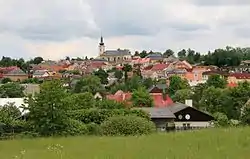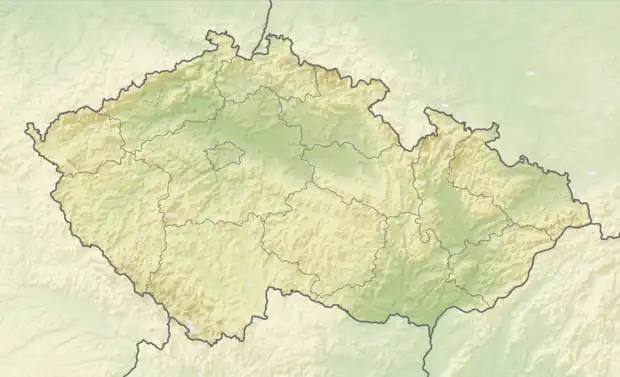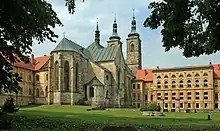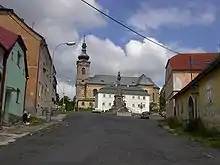Teplá
Teplá (German: Tepl) is a town in Cheb District in the Karlovy Vary Region of the Czech Republic. It has about 2,900 inhabitants. The historic town centre is well preserved and is protected by law as urban monument zone.
Teplá | |
|---|---|
 View from the south | |
 Flag  Coat of arms | |
 Teplá Location in the Czech Republic | |
| Coordinates: 49°58′55″N 12°51′47″E | |
| Country | |
| Region | Karlovy Vary |
| District | Cheb |
| First mentioned | 1197 |
| Government | |
| • Mayor | Karel Hermann |
| Area | |
| • Total | 113.21 km2 (43.71 sq mi) |
| Elevation | 690 m (2,260 ft) |
| Population (2023-01-01)[1] | |
| • Total | 2,926 |
| • Density | 26/km2 (67/sq mi) |
| Time zone | UTC+1 (CET) |
| • Summer (DST) | UTC+2 (CEST) |
| Postal code | 364 61 |
| Website | www |
Administrative parts
Villages of Babice, Beranov, Beranovka, Beroun, Bezvěrov, Bohuslav, Číhaná, Heřmanov, Horní Kramolín, Hoštěc, Jankovice, Kladruby, Klášter, Křepkovice, Mrázov, Nezdice, Pěkovice, Popovice, Poutnov, Rankovice, Služetín, Staré Sedlo and Zahrádka are administrative parts of Teplá.
Geography
Teplá is located about 28 km (17 mi) south of Karlovy Vary. It lies in the Teplá Highlands, on the Teplá River. The highest point is the hill Služetínský vrch at 774 m (2,539 ft) above sea level.
Teplá is situated in the Slavkov Forest Protected Landscape Area.
History

The Teplá Abbey was founded in 1193 by nobleman Hroznata of Ovenec. The first written mention of the town next to the abbey is from 1197. In the 13th century, the town had strategic importance of the land gate with customs and a market and played an important role in land defense. In these times most of the villages in the neighborhood, later incorporated to the municipality, were founded.[2]
Demographics
|
|
| ||||||||||||||||||||||||||||||||||||||||||||||||||||||
| Source: Censuses[3][4] | ||||||||||||||||||||||||||||||||||||||||||||||||||||||||
Sights

The most significant monument is the Baroque complex of the Teplá Abbey. Its oldest preserved part is the Romanesque-Gothic Church of the Annunciation of the Lord. The complex is opened to the public and serves also as a library, museum and gallery.[5]
The Gothic Church of Saint Giles in the town's centre was built on the site of the former church in 1762–1765. Its most valuable part are frescoes from scenes from the life of Saint Giles by Elias Dollhopf from 1765.[6]
The Renaissance town hall belong to the oldest buildings in the town. It was built in 1572–1574 and formerly served as a Latin school. Valuable is also the Old Town Hall, built in the Baroque style in 1698.[7]
There are three significant mineral springs in Teplá, the best of which is Oriona. Until 1945, a bottling plant stood at the source of Oriona. Now it's just a well covered with a gazebo.[8]
Notable people
- Gerhard Auer (1943–2019), German rower, Olympic champion
References
- "Population of Municipalities – 1 January 2023". Czech Statistical Office. 2023-05-23.
- "Podrobná historie města" (in Czech). Město Teplá. Retrieved 2021-06-07.
- "Historický lexikon obcí České republiky 1869–2011 – Okres Cheb" (in Czech). Czech Statistical Office. 2015-12-21. pp. 13–14.
- "Population Census 2021: Population by sex". Public Database. Czech Statistical Office. 2021-03-27.
- "Klášter premonstrátů Teplá" (in Czech). Město Teplá. Retrieved 2021-06-07.
- "Památky města" (in Czech). Město Teplá. Retrieved 2021-06-07.
- "Stará radnice a renesanční budova s mansardovou střechou v Teplé" (in Czech). CzechTourism. Retrieved 2022-06-03.
- "Kyselka Oriona u Teplé" (in Czech). CzechTourism. Retrieved 2022-06-03.
- "Zajímavé weby" (in Czech). Město Teplá. Retrieved 2021-12-08.